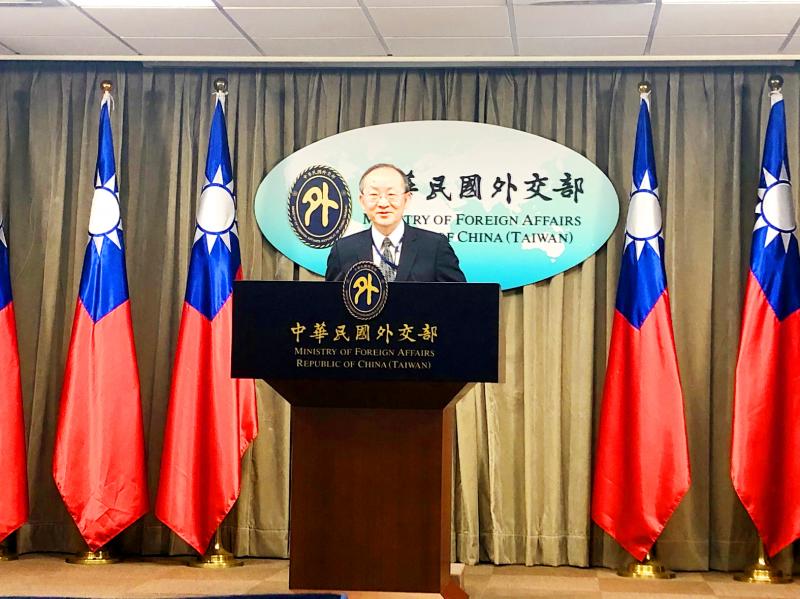Taiwan warned the WHO and China about possible human-to-human transmission of the new coronavirus at the end of last year, but the global health body did not make it public, the Ministry of Foreign Affairs said yesterday.
Department of International Organizations Director-General Bob Chen (陳龍錦) made the remark at a news briefing in Taipei, when asked about statements made by US Department of State spokeswoman Morgan Ortagus.
“Dec. 31— that’s the same day Taiwan first tried to warn WHO of human-human transmission. Chinese authorities meanwhile silenced doctors and refused to admit human-human transmission until Jan. 20, with catastrophic consequences,” Ortagus wrote on Twitter yesterday.

Photo: Lu Yi-hsuan, Taipei Times
Her tweet was in response to a post by Chinese Ministry of Foreign Affairs spokeswoman Hua Chunying (華春瑩), who wrote that the Wuhan Municipal Health Commission had issued a notice about the virus on Dec. 31 last year.
The commission’s notice reported 27 cases, including seven severe ones, in Wuhan, but said that no obvious transmission among people had been observed.
The Centers for Disease Control on Dec. 31 last year did ask China and the WHO’s International Health Regulations contact for information about the abnormal outbreak of pneumonia in Wuhan, while the ministry’s representative office in Geneva, Switzerland, also contacted the WHO secretariat, Chen said.
On the same day, the centers started implementing onboard inspections on direct flights from Wuhan landing in Taiwan, he said.
The WHO later replied that it received the message and would transfer it to other experts, but did not make it public, he said.
There are e-mail records of the communication between the centers and the WHO, he added.
Taiwan’s disease prevention strategy was predicated on the concept that the virus could be transmitted among people, ministry spokeswoman Joanne Ou (歐江安) said.
The nation thanks the US and other like-minded nations for their support, and would work with the global community to contain the virus, she said.
Meanwhile, the WHO secretariat is still evaluating whether to convene the 73rd session of the World Health Assembly from May 17 to 21, turn it into a virtual meeting or postpone it until autumn, Chen said.
Although it is almost impossible for WHO Director-General Tedros Adhanom Ghebreyesus to invite Taiwan to join the assembly as an observer, the ministry would continue to push for Taiwan’s participation in the meeting, he said.
In other developments, British Secretary of Foreign and Commonwealth Affairs Dominic Raab has advised all Britons who are usually based in the UK to return home soon, given the rapidly changing situation regarding travel restrictions and flights, the British Office Taipei said in a statement.
The advice does not apply to Britons who are residents in Taiwan.

MUSICAL INTERLUDE: During the altercations, KMT Legislator Hsu Chiao-hsin at one point pulled out a flute and started to play the national anthem A massive brawl erupted between governing and opposition lawmakers in the main chamber of the legislature in Taipei yesterday over legislative reforms. President-elect William Lai (賴清德) is to be inaugurated on Monday, but his Democratic Progressive Party (DPP) lost its majority in the legislature and the Chinese Nationalist Party (KMT) has been working with the Taiwan People’s Party (TPP) to promote their mutual ideas. The opposition parties said the legislative reforms would enable better oversight of the Executive Yuan, including a proposal to criminalize officials who are deemed to make false statements in the legislature. “The DPP does not want this to be

Singapore yesterday swore in Lawrence Wong (黃循財) as the city-state’s new prime minister in a ceremony broadcast live on television after Lee Hsien Loong (李顯龍) stepped down following two decades in office. Wong, formerly deputy prime minister, was inaugurated at the Istana government office shortly after 8pm to become the second person outside the Lee family to lead the nation. “I ... do solemnly swear that I will at all times faithfully discharge my duties as prime minister according to law, and to the best of my knowledge and ability, without fear or favor, affection or ill-will. So help me God,” the

BASIC OPERATIONS: About half a dozen navy ships from both countries took part in the days-long exercise based on the Code for Unplanned Encounters at Sea An unpublicized joint military exercise between Taiwan and the US in the Pacific Ocean last month was carried out in accordance with an international code, the Ministry of National Defense (MND) said yesterday. According to a Reuters report citing four unnamed sources, the two nations’ navies last month conducted joint drills in the Western Pacific. The drills were not made public at the time, but “about half-a-dozen navy ships from both sides, including frigates and supply and support vessels, participated in the days-long exercises,” Reuters reported, citing the sources. The drills were designed to practice “basic” operations such as communications, refueling and resupplies,

‘TOO LATE’: Yu Pei-chen, a Taoyuan councilor and ex-army general, said the Chinese officials were 41 years late in imposing sanctions on him, as he enlisted in 1983 China’s Taiwan Affairs Office (TAO) yesterday announced sanctions against five Taiwanese politicians, pundits and public figures critical of Beijing, accusing them of spreading disinformation about China. The five are: Liu Bao-jie (劉寶傑), Lee Zheng-hao (李正皓), Wang Yi-chuan (王義川), Yu Pei-chen (于北辰), Huang Shih-tsung (黃世聰), TAO spokesman Chen Binhua (陳斌華) told a routine news briefing, adding that the sanctions included their families. They were responsible for making up and spreading false information about China that “deceived some Taiwanese, sowed division ... and harmed brotherly goodwill across the Strait,” Chen said. Speech is not free from the regulations of Chinese law, which punishes manufacturing incorrect